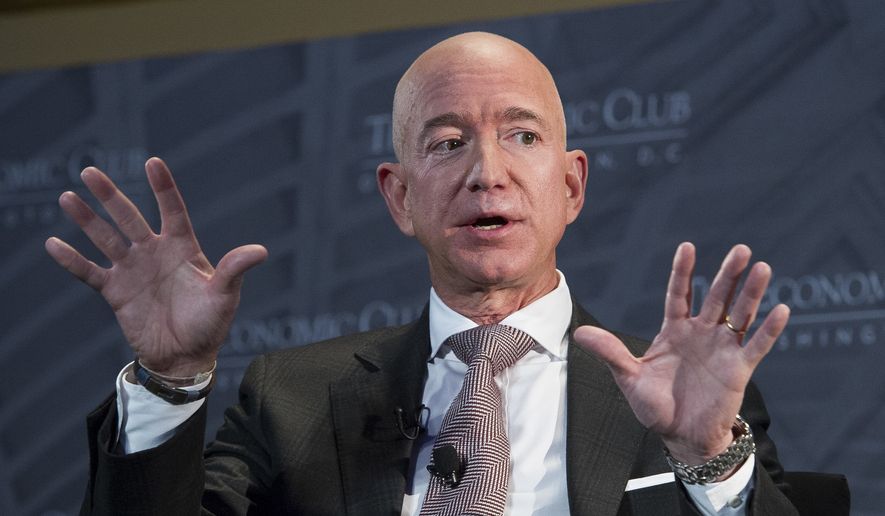NEW YORK (AP) — After a yearlong search for a second home, Amazon is now reportedly looking to build offices in two cities instead of one, a surprise move that could still have a major impact on the communities it ultimately selects.
New York’s Long Island City as well as Crystal City in northern Virginia have emerged as the front runners, according to sources familiar with the talks with Amazon.
Selecting those areas would bring more jobs to places that already have plenty. Jed Kolko, the chief economist at job site Indeed, said that choosing New York and the D.C. area would “be a much less radical move than many imagined” and another example of “rich places getting richer.”
The company had originally promised to bring 50,000 new high-paying jobs to one location, which founder and CEO Jeff Bezos said would be “a full equal” to its Seattle home base. Amazon may now split those jobs equally between two locations, The Wall Street Journal reported, with each getting 25,000.
That would beg the question of whether the new locations would be headquarters at all. Kolko said a headquarters is “where the decision makers are,” but it’s unclear where Amazon’s executives — such as Bezos — would spend much of their time. If Amazon decides to split the 50,000 workers in two places, each of those offices would be smaller than Seattle’s, which has more than 40,000 employees.
Virginia officials and some state lawmakers were recently briefed by the head of the state’s economic development office that Amazon was considering splitting up its second headquarters, according to a person familiar with the matter.
Officials in Virginia believe there’s a strong likelihood Amazon will pick Crystal City as one of its sites, but the company has not said anything definitive, according to the person, who was not authorized to speak on the record.
“They’re a real secretive company,” the person said.
One of the other areas the online retail giant is considering is Long Island City, according to a source familiar with the talks. Across the East River from midtown Manhattan, Long Island City is a longtime industrial and transportation hub that has become a fast-growing neighborhood of riverfront high-rises and redeveloped warehouses, with an enduring industrial foothold and burgeoning arts and tech scenes.
Amazon has been tight-lipped about the process and declined to comment on the latest news. There’s been intense competition to win over the company, with some throwing around billions of dollars in tax incentives. Amazon kicked off its hunt for a second headquarters in September 2017, initially receiving 238 proposals before narrowing the list to 20 in January.
New York Gov. Andrew Cuomo met two weeks ago with Amazon officials in his New York City offices, according to the source, who was not authorized to discuss the negotiations and spoke on condition of anonymity. Cuomo offered to travel to Amazon’s Seattle hometown to continue talks, the source said.
On Tuesday, Cuomo told reporters that Amazon is looking at Long Island City, but didn’t say if it was a finalist. He said winning over Amazon would give an economic boost to the entire state, and joked that he was willing to change his name to “Amazon Cuomo” to lure the company.
An estimated 135,000 or more people live in Long Island City and neighboring Sunnyside and Woodside, and the median household makes about $63,500 a year, a bit higher than the citywide median, according to New York University’s Furman Center housing and urban policy think tank. About 40 percent of people over 25 in the Long Island City area have a bachelor’s or higher degree, slightly above the citywide rate, the Furman Center’s data shows.
The New York Times reported Monday that Amazon is finalizing deals to locate to Long Island City and the Crystal City section of Arlington, Virginia, just outside Washington, D.C. The Wall Street Journal, which first reported on the possible plan to split the headquarters between two cities, said Dallas is also still a contender. Both newspapers cited unnamed people familiar with the decision-making process.
A spokesman for the Dallas Regional Chamber declined to comment.
Long Island City and Crystal City would meet Amazon’s requirements for a new locale: Both are near metropolitan areas with more than a million people, have nearby international airports, direct access to mass transit and have room for the company to expand.
Other locations that were on Amazon’s list of 20 either declined to comment or said they haven’t heard from the online retailer.
Jay Ash, the economic development chief in Massachusetts, said Tuesday that he’s had “no recent contact” with Amazon about a headquarters in Boston, but his office is still talking with the company about other opportunities. Earlier this year, Amazon unveiled plans for an office expansion in Boston’s Seaport District, promising 2,000 new technology jobs by 2021 in fields including machine learning and robotics.
Amazon has said it could spend more than $5 billion on the new headquarters over the next 17 years, about matching the size of its current home in Seattle, which has 33 buildings and 23 restaurants.
The company already employs more than 600,000 worldwide. That’s expected to increase as it builds more warehouses across the country to keep up with online orders. Amazon recently announced that it would pay all its workers at least $15 an hour, but the employees at its second headquarters will be paid a lot more - an average of more than $100,000 a year.
Earlier this month, Bezos said during an on-stage interview in New York that the final decision will come down to intuition.
“You immerse yourself in that data, but then you make that decision with your heart,” he said.
___
Klepper reported from Albany, New York, and Suderman reported from Richmond, Virginia. AP Technology Writer Matt O’Brien in Providence, Rhode Island, and Terry Wallace in Dallas and Jennifer Peltz in New York also contributed to this report.




Please read our comment policy before commenting.